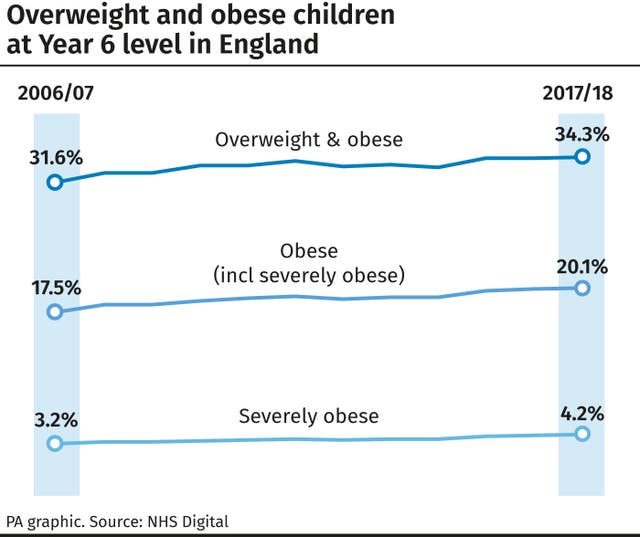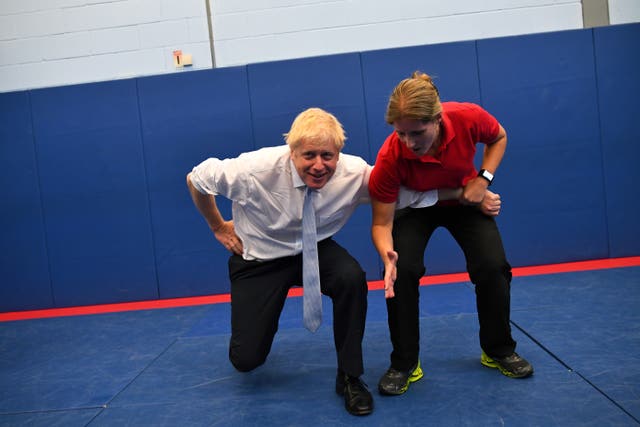Boris Johnson has been accused of “turning back the clock” on the fight against childhood obesity with his pledge to review so-called sin taxes.
The frontrunner in the race to become prime minister came under heavy criticism after promising to review the taxes, which include levies on sugar, tobacco and alcohol.
The Tory MP vowed not to introduce new sin taxes or increase current levels unless a review concludes they are effective and do not unfairly hit those on low incomes.
The sugar tax on soft drinks has been celebrated by the Treasury for shrinking the amount of sugar in the national diet by 45 million kg a year and for raising millions in sports funding.
The commitment on Wednesday came as Cancer Research UK warned that obesity causes more cases of some cancers than smoking.
It also came as a key ally to Mr Johnson, Health Secretary Matt Hancock, prepared to publish a green paper recommending the extension of the sugar tax to milkshakes.

Royal Society for Public Health (RSPH) chief executive Shirley Cramer said the organisation was “seriously disappointed” by the announcement and praised moves to tackle the childhood obesity epidemic.
“One of the successes of the last Conservative Government was the introduction of the sugar levy for soft drinks. The evidence shows that the sugar levy has worked,” she said.
“We should be building on the success of the sugar levy, not turning back the clock on the progress that has been made so far.”
Cancer Research UK chief executive Michelle Mitchell praised the successes of taxation, including the sugar tax introduced in April last year.
“They have been highly effective in bringing down smoking rates to record lows, including within deprived communities,” she said.
“Physical activity is one way to lose weight but the Government also has a big role to play if we are to significantly reduce obesity levels.”
The Obesity Health Alliance’s Caroline Cerny said voluntary programmes for the food industry to cut sugar “have not had the same success” as the tax.
“The levy is supported by the public and welcomed by a wide range of health experts and is vitally needed as part of a package of measures to help create a healthier environment for everyone,” she said.
Shadow health secretary Jonathan Ashworth said the move to “water down” the obesity strategy was “extraordinary”.
“Boris Johnson has shown that his priority is representing the interests of his wealthy supporters, with no concern for the health and well-being of the general public,” the Labour MP said.

Former health minister Steve Brine, who backs Mr Johnson’s opponent, Jeremy Hunt, said he felt “despair” at the proposal.
“Transparent dog whistle politics dressed up as something thinking. It is the exact opposite,” the Tory MP said.
The proposal also exposed a split in Mr Johnson’s campaign.
Mr Hancock had commissioned England’s chief medical officer, Professor Dame Sally Davies, to consider taxing all unhealthy foods to tackle childhood obesity.
The Health Secretary said he was not consulted about the announcement in advance, with a source close to him telling PA “he didn’t know about it before it went out”.
Liz Truss, a rival to Mr Hancock in the contest to become Mr Johnson’s chancellor if he succeeds, has frequently hit out at state intervention on people’s ability to choose what they eat.
She said Mr Johnson’s policy was “great” as “taxes on treats hit those on lowest incomes”.

But Mr Hancock’s allies believe that Mr Johnson’s policy is more nuanced.
“It looks like, from what Boris has put out, it is essentially saying we need to make sure we are led by the evidence and that we make sure that policies like this are guided by the evidence to have the behavioural impact you want,” one ally said.
“Matt has always been in favour of being guided by the evidence.”
As London mayor in 2016, Mr Johnson introduced a 10p levy on all added-sugar soft drinks sold in the City Hall cafe saying tackling obesity, was “one of the biggest” health challenges.
But announcing his latest proposal, he said a tax on milkshakes “seems to me to clobber those who can least afford it”.
“Rather than just taxing people more, we should look at how effective the so-called ‘sin taxes’ really are, and if they actually change behaviour,” he said.
Labour and the RSPH expressed concern that Mr Johnson’s policy was being influenced by the food and drinks lobby, with one adviser reportedly being employed by lobbying firm Edelman, which works for Coca-Cola.
Tamasin Cave, a campaigner with the research group Spinwatch, said Mr Johnson offers an “open door” to lobbyists.
“There are a lot of corporate lobbyists around him who I suspect are feeding ideas into him without any public scrutiny as to who gets a quiet word in his ear,” she said.
Mr Johnson’s campaign announcement cited taxes on products high in salt, fat and sugar as examples.
His team did not immediately respond to requests as to whether the review would also include cigarettes and alcohol taxation.
But campaigners were quick to stress their significance, with Action on Smoking and Health chief executive Deborah Arnott saying a move away from current tobacco taxing would be a “grave error”.

















